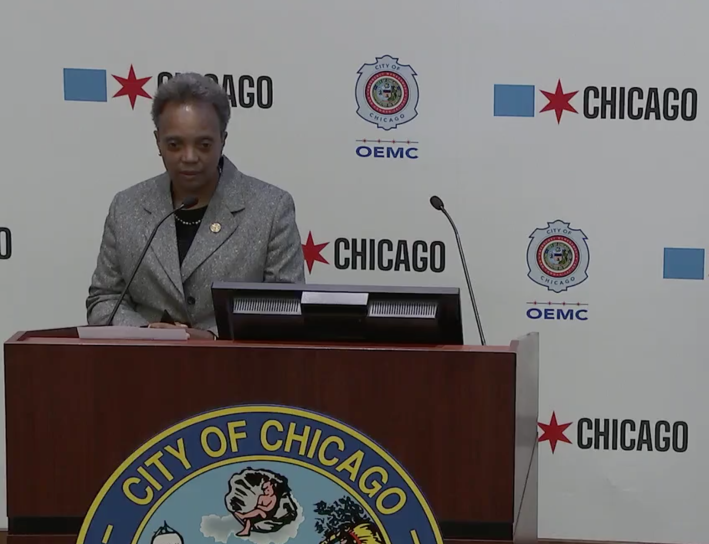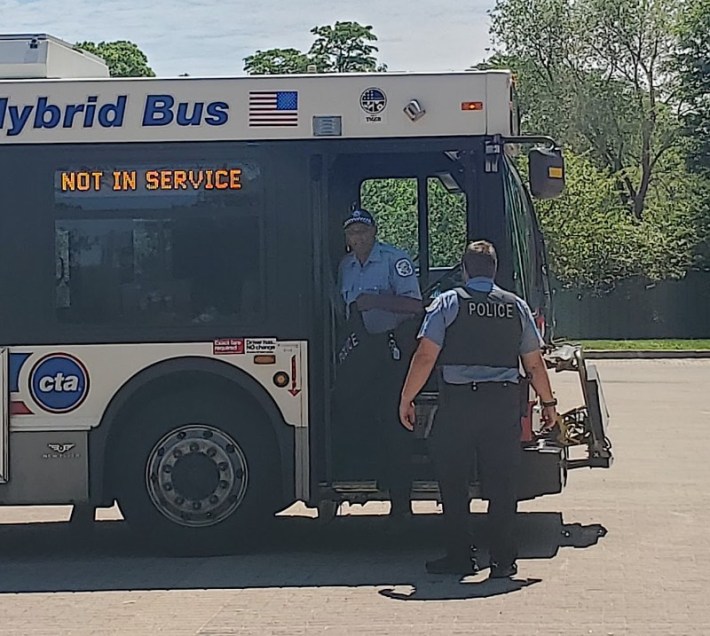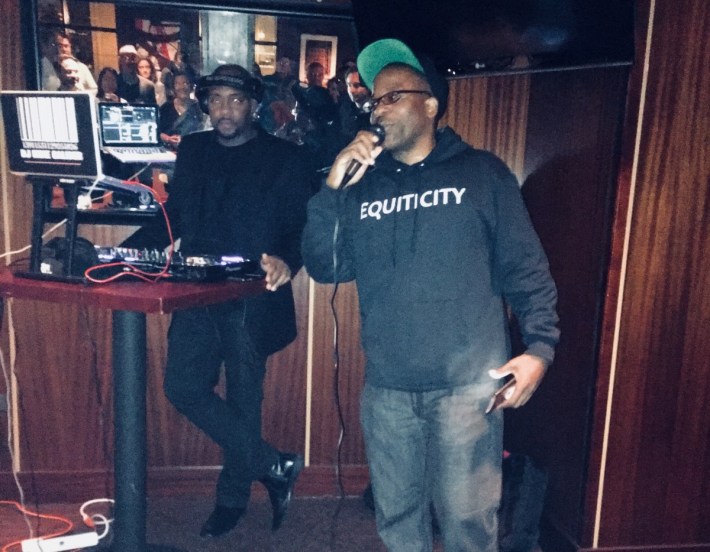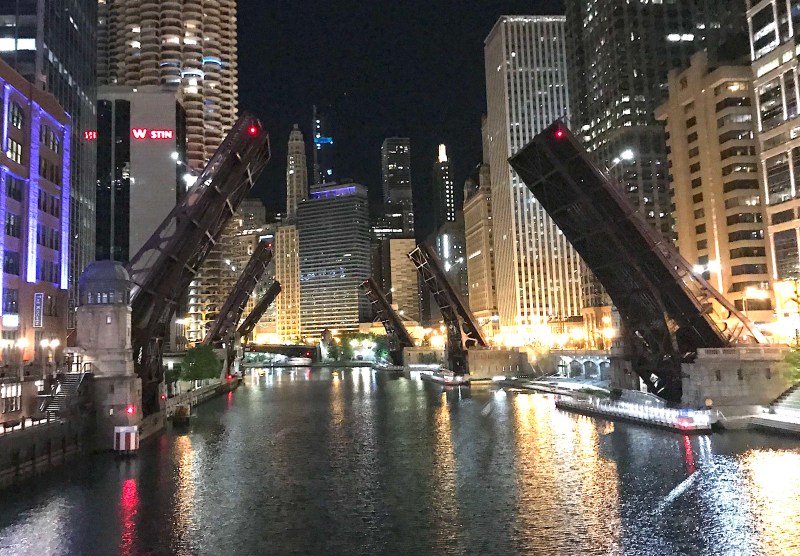During the protests and civil unrest in the wake of the George Floyd police murder and a police shooting in Englewood this summer, Chicago mayor Lori Lightfoot shut down transit service to downtown, as well as the Divvy bike-share system, leaving essential workers scrambling for ways to get to and from work. And last month when the Breonna Taylor decision led to demonstrations at the Chicago Police Department headquarters, CTA service was diverted from the area to discourage people from participating.
In response to these decisions, more than a dozen transportation advocacy groups, civic organizations, and racial justice nonprofits launched a petition calling on Lightfoot and local transit agencies to commit to keeping public transportation running in the event of any future unrest, such as what might happen during next week's contentious election. 721 people have signed the petition so far.
During Lightfoot's press conference this morning on public safety preparations for Halloween weekend and Tuesday's election, Streetsblog asked the mayor the following question. "Transit and bike-share shutdowns during protests, like the ones Chicago implemented during recent Black Lives Matter demonstrations, hurt transit-dependent people the most and discourage free speech. In response to calls from transportation advocacy and civic groups, you recently said you will 'avoid any shutdown of transit options in the future.' Will you commit to not shutting down the CTA and Divvy if people take to the streets during next week’s election?"
"I am pretty confident I never said that I will never shut down transit," Lightfoot responded.
Here's a part of the statement Lightfoot's office sent to WTTW on the subject in mid-October, emphasis added.
The evolving nature of the unrest and public safety incidents from this past summer required our Office of Emergency Management, [the Chicago Police Department], and transportation departments to take swift action to respond to dangerous situations in order to help ensure the safety of residents, as well as transit employees and customers, which is and must remain a priority. It is of the utmost importance for us to work together with city officials, community leaders and other stakeholders to achieve a workable balance of these interests and avoid any shutdown of transit options in the future.
Here's the rest of Lightfoot's response to Streetsblog's question today.
And let me remind folks: In the heightened days of June we were seeing massive protests and many of those protests turning violent, both in the downtown area and otherwise. Our transit workers felt threatened. We had people trying to take over buses and putting transit workers at risk. We had people trying to take over trains and putting transit workers at risk. The transit unions themselves were reaching out to me in a panic and asking for us to do things that were necessary to protect the workers, including shutting down transit.
So I hope that we never see again in this city that kind of violence. But if we do, and if there's a reason for us to take those extreme measures, I'm not going to hesitate to do that. Obviously shutting down transit is an incredible inconvenience. That's why the Chicago Transit Authority was the only major transportation system in the country that ran at full levels throughout the pandemic. Every other transit system -- New York, Philadelphia, all the others -- shut or scaled back significantly their offerings. We know that in this city there are workers who really depend upon the transit authority to get to and from their place of business.
But we also have to balance that against any security risk. We don't see that as happening, but if it's necessary, I'm not going to hesitate.

Keith Hill, president of Amalgamated Transit Union Local 241, which represents CTA operators, told me the mayor's comments about transit workers' perspectives on the issue were accurate, and he applauded them. "I commend the mayor, and I stand with her on that."
Hill said that during this summer's civil unrest, looters tried to board CTA buses with stolen items, and when drivers refused to transport them, confrontations ensued. "My operators come to work to move people, not to be in the middle of a riot," he said. He added that if conditions are unsafe for CTA operators during periods of unrest and the city does not shut down the system, he will tell his union members not to come to work. "Look, I'm not going to put my people at risk. Until y'all get the city under control, we're not going to move the buses."
However, not all union members share that view. During a June press conference, bus driver Erek Slater questioned the shutdowns, and also protested the use of CTA buses to transport law enforcement. “We are in the middle of a pandemic and medical workers have to use public transit to get to work,” he said. “Now public transit is shut down because of legitimate protest against state violence? Is using CTA buses to block protests a legitimate use of public transit? Is driving National Guard and police to scenes of physical conflict safe for public transit workers?”

The petition against transit shutdowns also argues that transit workers, buses and facilities should never be used to transport law enforcement.
Representative of organizations that signed on to the petition said they were disappointed by Lightfoot's comments today. "Shutting down transit is not just an inconvenience, it harms the most vulnerable Chicagoans," said Active Transportation Alliance advocacy manager Julia Gerasimenko. "From people with disabilities who require home healthcare workers for help with daily essential needs, to nurses and doctors in our hospitals, to undocumented kitchen workers in our city’s beloved restaurants, transit is an essential part of these Chicagoans’ daily lives."
Gerasimenko argued that without a commitment from Lightfoot and the agencies to keep transit running during civil unrest, residents across the city are left wondering if they’ll be left stranded again. "Transit riders and operators deserve a commitment that they will be kept safe and moving towards their destination."
Metropolitan Planning Council transportation director Audrey Wennink expressed similar frustration. "Public transportation is a public good that thousands depend on every day -- it is not something to be turned on and off at will. We need to avoid repeating the mistakes of May and August regarding extensive transit and Divvy shutdowns with little public notice."
Wennink said she hopes top city officials will to listen to transportation leaders like Chicago Department of Transportation commissioner Gia Biagi and CTA president Dorval Carter, in making any future decisions in the event of unrest next week. "Chicago residents need to be able to depend on reliable transportation at all times."

Oboi Reed, head of the mobility justice nonprofit Equiticity, argued that Lightfoot's comments reflect a commitment to policies and practices that are structurally racist. "Black people have historically taken the brunt of police abuse, overpolicing, transportation inequities, and now the impact of COVID. Abrupt transit and other transportation shutdowns in Chicago reflect a history of top-down policymaking in Chicago that is harmful to Black and Brown residents of our city. It hurts essential workers and those transit-dependent, many of whom are Black and Brown, and low-to-moderate-income. It also hurts those on the frontlines of the rebellions, putting their physical safety at risk fighting for a racially equitable and just Chicago."
Kyle Lucas, cofounder of the new transportation advocacy organization Better Streets Chicago (Streetsblog Chicago assistant editor Courtney Cobbs also helped launch the group) also blasted Lightfoot's response. "We’d love for the mayor to explain exactly how trapping protesters downtown improves their safety or the safety of workers, but we already know that it doesn’t," he said. "The only purpose it serves is to suppress Chicagoans’ voices by escalating conflict... We’d also be interested in knowing if the Mayor plans on picking up the tab for workers stranded by public transit [shutdowns], spending in some cases over $60 one-way on ride-hail to get to work from the South and West sides."
Hopefully any protests that happen next week will stay peaceful, and the police department will avoid escalating any conflicts that do arise with a violent response. But unfortunately Mayor Lightfoot's comments indicate that if more civil unrest does occur, transit shutdowns are still on the table. That would result in thousands of essential workers and at-risk Chicagoans being stranded once more.




